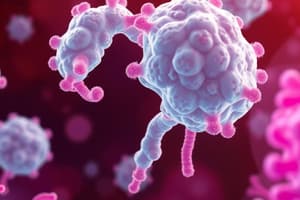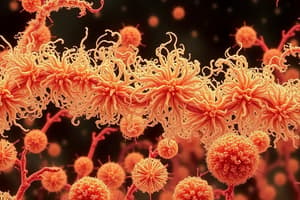Podcast
Questions and Answers
Which organism is responsible for anthrax?
Which organism is responsible for anthrax?
- Escherichia coli
- Staphylococcus aureus
- Vibrio cholerae
- Bacillus anthracis (correct)
Biogenesis is the idea that life arises from non-living matter.
Biogenesis is the idea that life arises from non-living matter.
False (B)
What is the definition of microbiology?
What is the definition of microbiology?
The study of organisms that are too small to be seen with the naked eye.
The system developed by Carolus Linnaeus for naming and classifying organisms is called __________.
The system developed by Carolus Linnaeus for naming and classifying organisms is called __________.
What is the germ theory?
What is the germ theory?
Match the following individuals with their contributions:
Match the following individuals with their contributions:
Fungi, protozoa, and algae are all classified as prokaryotes.
Fungi, protozoa, and algae are all classified as prokaryotes.
What is the primary purpose of pasteurization?
What is the primary purpose of pasteurization?
Which of the following is true about the genus and specific epithet in biological nomenclature?
Which of the following is true about the genus and specific epithet in biological nomenclature?
Eukarya includes cell types that lack a nucleus.
Eukarya includes cell types that lack a nucleus.
What are the three domains of life?
What are the three domains of life?
Viruses are classified as __________ microbes.
Viruses are classified as __________ microbes.
Match the scientist with their contribution to the spontaneous generation debate:
Match the scientist with their contribution to the spontaneous generation debate:
Which of the following conclusions did Lazzaro Spallanzani reach?
Which of the following conclusions did Lazzaro Spallanzani reach?
Francesco Redi's experiments supported the theory of spontaneous generation.
Francesco Redi's experiments supported the theory of spontaneous generation.
What were the four questions scientists were trying to answer during the Golden Age of Microbiology?
What were the four questions scientists were trying to answer during the Golden Age of Microbiology?
Flashcards
Anthrax
Anthrax
Disease caused by the bacterium Bacillus anthracis.
Cholera
Cholera
Infection caused by the bacterium Vibrio cholerae.
Microbiology
Microbiology
The study of microorganisms not visible to the naked eye.
Microorganisms (microbes)
Microorganisms (microbes)
Signup and view all the flashcards
Taxonomy
Taxonomy
Signup and view all the flashcards
Prokaryote
Prokaryote
Signup and view all the flashcards
Eukaryote
Eukaryote
Signup and view all the flashcards
Spontaneous Generation
Spontaneous Generation
Signup and view all the flashcards
Biogenesis
Biogenesis
Signup and view all the flashcards
Germ Theory
Germ Theory
Signup and view all the flashcards
Pathogen
Pathogen
Signup and view all the flashcards
Fermentation
Fermentation
Signup and view all the flashcards
Pasteurization
Pasteurization
Signup and view all the flashcards
Bioremediation
Bioremediation
Signup and view all the flashcards
Antoni van Leeuwenhoek
Antoni van Leeuwenhoek
Signup and view all the flashcards
Carolus Linnaeus
Carolus Linnaeus
Signup and view all the flashcards
Study Notes
Outbreaks
- Anthrax: Caused by Bacillus anthracis.
- Cholera: Caused by Vibrio cholerae.
Definitions
- Microbiology: Study of microorganisms, organisms invisible to the naked eye.
- Microorganisms (microbes): Organisms that require a microscope for observation.
- Taxonomy: System for naming and classifying organisms based on morphology and physiology.
- Prokaryote: Organism without a membrane-bound nucleus (e.g., bacteria).
- Eukaryote: Organism with a nucleus (e.g., plants, animals, fungi, protists).
- Spontaneous Generation (abiogenesis): Concept of life arising from non-living matter.
- Biogenesis: Theory that all living things arise from other living things.
- Hypothesis: An educated guess.
- Theory: Well-supported explanations based on scientific evidence.
- Morphology: Study of organisms’ structure and appearance.
- Etiology: Investigation of disease causes.
- Germ theory: Concept that microorganisms cause diseases.
- Pathogen: Specific microbes that lead to diseases.
- Fermentation: Process where sugar is converted to alcohol or other byproducts.
- Pasteurization: Method of heating to kill most bacteria before yeast addition.
- Bioremediation: Use of microbes to clean environmental pollutants.
- Chemotherapy: Use of chemicals for disease treatment, discovering "magic bullets."
Key Figures in Microbiology
-
Antoni van Leeuwenhoek (1632-1723)
- Dutch merchant known for pioneering microscopy.
- First to observe living microbes including prokaryotes, fungi, protozoa, algae, and small animals.
-
Carolus Linnaeus (1707-1778)
- Developed a systematic nomenclature for organisms.
- Taxonomy: Naming and classifying organisms based on morphology and physiology.
Writing Organism Names
- Genus: Always capitalized.
- Specific epithet: Always lowercase.
- Typing: Italics.
- Handwritten: Underlined.
Three Domains of Life
-
Bacteria: Prokaryotic cells without a membrane-bound nucleus.
-
Archaea: Prokaryotic, metabolically diverse, inhabiting extreme environments.
-
Eukarya: Eukaryotic cells with a nucleus (e.g., plants, animals, fungi, protists).
-
Viruses: Acellular entities not part of the three domains, lacking cellular structure.
Golden Age of Microbiology Questions
- Possibility of spontaneous generation of microbial life?
- What causes fermentation?
- What are the causes of diseases?
- Methods to prevent infection or disease?
Spontaneous Generation Debate Contributors
- Aristotle: Proposed spontaneous generation in 384-322 BC.
- Francesco Redi: Challenged spontaneous generation in the 1600s with a meat experiment; concluded flies came from other flies.
- John Turberville Needham: Supported spontaneous generation in the 1740s through a broth experiment; saw microbial growth in inadequately sealed flasks.
- Lazzaro Spallanzani: Disproved spontaneous generation in 1799; demonstrated no microbial growth in properly sealed flasks.
- Louis Pasteur: Conclusively disproved spontaneous generation in the 1860s using swan-neck flasks; demonstrated that life arises from pre-existing life, cementing the theory of biogenesis.
Studying That Suits You
Use AI to generate personalized quizzes and flashcards to suit your learning preferences.




